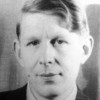Base words are uttered only by the base
And can for such at once be understood;
But noble platitudes — ah, there’s a case
Where the most careful scrutiny is needed
To tell a voice that’s genuinely good
From one that’s base but merely has succeeded.
Quotations by:
Auden, W. H.
One can only blaspheme if one believes.
W. H. Auden (1907-1973) Anglo-American poet [Wystan Hugh Auden]
“Concerning the Unpredictable,” Forewords and Afterwords (1973)
(Source)
Evil is unspectacular and always human
And shares our bed and eats at our own table.
About suffering they were never wrong,
The Old Masters; how well, they understood
Its human position; how it takes place
While someone else is eating or opening a window or just walking dully along.W. H. Auden (1907-1973) Anglo-American poet [Wystan Hugh Auden]
“Musée des Beaux Arts” (1940)
Full text.
Young people, who are still uncertain of their identity, often try on a succession of masks in the hope of finding the one which suits them — the one, in fact, which is not a mask.
W. H. Auden (1907-1973) Anglo-American poet [Wystan Hugh Auden]
“One of the Family” (1965), Forewords and Afterwords (1973)
(Source)
Before people complain of the obscurity of modern poetry, they should first examine their consciences and ask themselves with how many people and on how many occasions they have genuinely and profoundly shared some experience with another; they might also ask themselves how much poetry of any period they can honestly say that they understand.
Perhaps there is only one cardinal sin: impatience. Because of impatience we were driven out of Paradise, because of impatience we cannot return.
We would rather be ruined than changed,
We would rather die in our dread
Than climb the cross of the moment
And let our illusions die.W. H. Auden (1907-1973) Anglo-American poet [Wystan Hugh Auden]
The Age of Anxiety, Part 6 [Malin] (1948)
(Source)
Among those whom I like or admire, I can find no common denominator, but among those whom I love, I can: all of them make me laugh.
W. H. Auden (1907-1973) Anglo-American poet [Wystan Hugh Auden]
The Dyer’s Hand and Other Essays, Part 7 “The Shield of Perseus,” “Notes on the Comic” (1962)
(Source)


